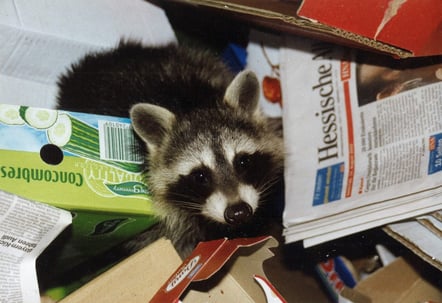Raccoon Information for Homeowners in NJ and PA
 The Texas Parks and Wildlife Department notes, “The name "raccoon" came from an Algonquian Indian word arakun, which means "he scratches with his hands." During the 1700s, American colonists dropped the "a" in arakun, and the name became raccoon.” It’s a fitting description to this day because of how dexterous their hands are. Raccoons can scale trees, dig through trashcans in residential areas, and search the bottom of streams for fish and frogs to eat. When coming into contact with residential homes, raccoons find shelter in attics, under decks, and in crawlspaces where they can hide from predators. Does it sound like someone is living in your attic? Those footsteps and scratching noises could indicate the presence of uninvited raccoon roommates. Raccoons are pudgy animals, weighing 7-20 lbs and standing 9-12 inches tall, measuring 2-3 feet long. Their coat is unmistakable, marked by the striped tail, masked face, and gray body.
The Texas Parks and Wildlife Department notes, “The name "raccoon" came from an Algonquian Indian word arakun, which means "he scratches with his hands." During the 1700s, American colonists dropped the "a" in arakun, and the name became raccoon.” It’s a fitting description to this day because of how dexterous their hands are. Raccoons can scale trees, dig through trashcans in residential areas, and search the bottom of streams for fish and frogs to eat. When coming into contact with residential homes, raccoons find shelter in attics, under decks, and in crawlspaces where they can hide from predators. Does it sound like someone is living in your attic? Those footsteps and scratching noises could indicate the presence of uninvited raccoon roommates. Raccoons are pudgy animals, weighing 7-20 lbs and standing 9-12 inches tall, measuring 2-3 feet long. Their coat is unmistakable, marked by the striped tail, masked face, and gray body.
How can I tell if there are raccoons in my attic?
Many homeowners in New Jersey and Pennsylvania have to deal with raccoons invading their attics. Raccoons are excellent climbers due to their dexterity. If a tree branch is leaning up against your roof, they can easily use this is as a natural bridge. Downspouts are also prone to raccoon climbing. By finding openings, such as holes in soffits, gaps where your gutter meets the roof, torn window screens, and broken vents, raccoons can slip through. If the hole isn’t big enough, they’ll destroy around its edges to widen it. They can also tear off loose vents that are old or broken.
The top signs that raccoons are living in your attic are:
- Hearing scratching and scurrying at night or occasionally during the day
- Seeing raccoons going in and out, or actually find them in the attic during the day
- Hearing whining, whimpering, or small crying noises could indicate baby raccoons in the attic
- Finding small dog-sized droppings in the attic
- Unpleasant odors radiating from the attic
Why is there a raccoon in my attic?
Raccoons may look fuzzy and cute, but the damage they cause when coming into contact with residential homes can be alarming. You’re probably wondering, “Why did they choose my attic over a natural living space?” With no predators, extra warmth in the fall and winter, and access to close by food and water, unclaimed attics are ideal. As you probably know, raccoons really love trash. Trash contains food scraps, and they’re not picky. This is an especially big problem if you don’t have secured lids on your trash cans. It’s all too common to wake up in the morning, only to find your trash bag has been torn open, trash scattered around, and the garbage can knocked over completely.

Bird feeders, vegetable gardens, and dog food left out overnight are even easier targets for raccoon snacking. If you have a koi pond, bird bath, or other areas that collect rainwater, raccoons can live. Now that they’ve found food and water, the last thing to do is find shelter. When raccoons explore your roof, they can find many ways to get in. Once they enter, it’s highly likely that they are trying to choose a protected space to have a family. From mid to late summer, raccoons breed. For several months, baby raccoons will stay with their mother, often in a safe space such as an attic. Raccoons can live 10-15 years, but will not spend their entire life in a single attic.
Are raccoons dangerous?
The biggest concern when it comes to wildlife in the New Jersey and Pennsylvania is the possibility for transmittable disease. Raccoons carry rabies, tularemia, canine distemper and hepatitis, raccoon ascarid (roundworms), giardiasis, and leptospira. Humans can contract illnesses spread by raccoons from exposure to their droppings, urine, saliva, bites, or scratches. For this reason we suggest that you never try to handle raccoons on your own. Dogs and cats that spend time outdoors can come into contact with raccoons. Just as in humans, they can contract illnesses such as rabies, distemper, and hepatitis. In addition to health concerns, raccoons can cause significant damage to your home and belongings if they live in your attic. Raccoons have been known to chew through wiring which can be a fire hazard. Personal belongings and other items stored in your attic can be ruined by urination and droppings.
How can I prevent raccoons?
Preventing raccoons is as simple as creating an environment that they find to be unfavorable. By securing trash can lids, taking down bird feeders, emptying bird baths, clearing general clutter from your property, and fixing broken or vulnerable areas on your roof, around the soffit, and in the attic, you can prevent raccoons. An abundant amount of raccoons live in our area, so there’s never going to be a completely fool-proof solution without professional pest control intervention.
Cooper Pest Solutions does not currently provide raccoon removal services.

